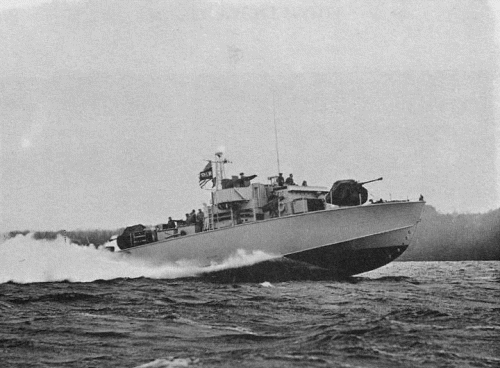
|
Names |
PT810, 12.1962- PTF1 |
|
Builders |
Bath Iron Wks: PT810 |
|
Commissioned |
11/1951: PT810 12/1962: PTF1 (2nd time) |
|
Losses |
none |
|
Transfers |
none |
|
Discarding |
11/1959: PT810 (1st time) 8/1965: PTF1 |
|
Displacement standard, t |
|
|
Displacement full, t |
90 |
|
Length, m |
27.1 |
|
Breadth, m |
7.35 |
|
Draught, m |
1.75 |
|
No of shafts |
4 |
|
Machinery |
4 Packard petrol engines |
|
Power, h. p. |
10000 |
|
Max speed, kts |
46 |
|
Fuel, t |
petrol |
|
Endurance, nm(kts) |
|
|
Armament |
2 x 1 - 40/60 Mk 3, 1 x 2 - 20/70 Mk 24, 1 x 1 - 12.7/90, 1 x 1 - 81/12 M29 mortar, 4 - 572 TR (never really carried), 4 DC |
|
Electronic equipment |
SPS-5 radar |
|
Complement |
17 |
Project history: PT809-812 were intended to embody wartime design lessons. All were aluminium; 809 was riveted, 810 riveted and welded, and 811 and 812 all-welded; each was designed to mount two single 40mm guns (one in 812), two twin 20mm, one 81mm mortar, one Mk 107 rocket launcher (812 only), four torpedo racks, and four depth charge racks; speed was set at 46kts (43 for the somewhat longer 812). Although these figures represented a considerable advance on Second World War practice, they still did not make up for the lack of an operational requirement for such coastal craft.
Modernizations: None.
Naval service: PT810 was stricken 1.11.1959 but was reinstated in December 1962 as fast patrol craft PTF1

PT810 1951
© Ivan Gogin, 2015